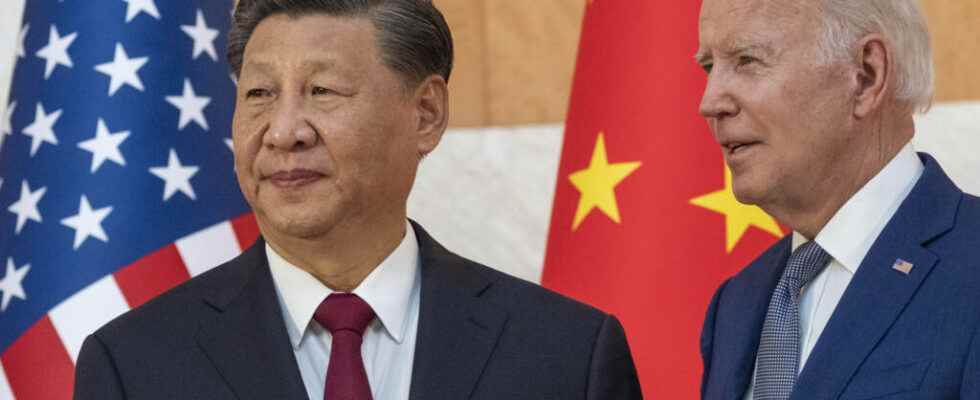On the occasion of the G20 summit which takes place in Bali from Tuesday, November 15, Joe Biden and Xi Jinping spoke, a first since the election of the American president, in a context of high tension between the two countries. For China as for the United States, the idea is to lower the temperature without making too many concessions.
There is the handshake, the smiles, without masks, of two heads of state who did not come to Bali to erase the differences on substantive issues, but at least we felt this intention on both sides, to try to calm the tense relationship between the two countries, reports our correspondent in Beijing, Stephane Lagarde. The two presidents spoke for almost three hours.
For Beijing, it is a question, as recalled by Chinese diplomacy, of finding “a correct way of coexisting between China and the United States while firmly defending the sovereignty, security and interests of China”. The White House for its part made it known that there would be no joint declaration, that Washington would not make fundamental concessions, while hoping that the meeting would help the two parties to set safeguards, limits to avoid that the conflict does not escalate.
Antony Blinken soon to visit China
Laying the foundations for a new relationship or a new cold war, both the United States and China want to buy time, on Taiwan, on economic and technological decoupling and on other subjects that mark the systemic rivalry between the two powers. The question of the war in ukraine was probably also discussed. Discussions which will a priori be little commented on since in the articles of the state press, the “commentary” function has been deactivated.
Following this meeting, it was agreed that US Secretary of State Antony Blinken would soon visit China.
The sign of a thaw with Australia
A first success for the G20 which has just opened in Bali, since the Australian Prime Minister, Anthony Albanese, confirmed that he would meet on Tuesday with Chinese President Xi Jinping, reports our correspondent in Sydney, Grégory Plesse. Relations between the two countries, despite intense trade relations, had deteriorated sharply in recent years. This is also the first meeting since 2016 between the leaders of these two countries. The sign of a thaw, even if many contentious issues between Beijing and Canberra are still unresolved.
In the time of Scott Morrison, the former Australian Prime Minister, members of the Chinese government no longer even answered calls from their counterparts in Canberra. But contact was immediately restored after Labor came to power last May between the Chinese and Australian ministers. But Prime Minister Anthony Albanese, who has not been idle on the international scene since his election, had not yet met the Chinese president. He confirmed upon arriving in Bali that they will speak to each other tomorrow: “We are approaching this discussion with goodwill. There are no preconditions for this exchange and I hope we will have a constructive dialogue.”
However, there are many areas of friction, China notably reproaches Australia for its alignment with the United States, again confirmed by the Minister of Defence, who during a recent trip to Washington, affirmed that the alliance with the United States was central to Australia’s national security, but also to its worldview.
And Australia does not digest the trade sanctions imposed unilaterally by Beijing, its first trading partner, which caused it to lose more than 12 billion euros in export earnings. Sanctions that this summit meeting could lift. In any case, this is what some understood when the Chinese Prime Minister declared a few days ago that Beijing was ready to go halfway to renew contact with Canberra.
►Also to listen: China, Russia, USA, EU: power rivalries
(And with AFP)
